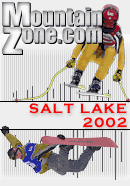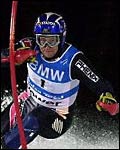|
Ski: Men's Super G
Norway's Aamodt Takes Gold, Sets Record
For the second time this week, Norway's Kjetil Andre Aamodt used the Snowbasin downhill course to establish himself as the greatest alpine skier in Olympic history. Aamodt won the men's super G here today, once again setting the Olympic record for most medals, seven, ever earned by an alpine skier.
Starting third, Aamodt established the time to beat at 1 minute, 21.58 seconds, then endured a barrage of Austrians, none of whom could best his time. Stephan Eberharter of Austria was closest, finishing 2nd in 1:21.68, followed by teammates Andreas Schifferer in 1:21.83 and Fritz Strobl in 1:21.92. Aamodt's teammate Bjarne Solbakken rounded out the top five in 1:22.10.
Victory in the super G came only three days after Aamodt earned his record-setting sixth Olympic medal by winning the combined event (downhill/slalom) at Snowbasin. He surpassed the mark of five medals shared by Italian Alberto Tomba, Vreni Schneider of Switzerland and Germany's Katja Seizinger.
Today's seventh medal sets Aamodt even further apart from the field, giving him a career total of three golds, two silvers and two bronzes. He also holds the title to 10 World Championship medals. "The last one is always the best one," Aamodt said. More than anything, the victory demonstrates Aamodt's unmatched ability to perform in major events. His last Olympic super G victory came 10 years ago in Albertville, France, and he has not been recognized for his mastery of the event since. "I haven't won the super G for six years, so I needed to get lucky. It was just unbelievable today. It's a dream come true," he said. "The combined was my event. I wanted to do well here, and I managed to do it. It gave me a lot of confidence. Today was just a bonus." The "undergate" set after the Buffalo Jump at the top of the final pitch into the Olympic stadium played a huge role in the outcome of the super-G race. The gate gave a capacity crowd plenty of excitement as several top competitors skied out, including Lasse Kjus of Norway and Sweden's Fredrik Nyberg. But even those who managed to negotiate the turn ran into problems, shooting into soft snow alongside the course and losing precious tenths of a second as they struggled to regain the line. Among them was Eberharter, the prohibitive favorite entering the race having won three of the four World Cup super G races this season, who likely lost the .1 second margin of victory on the final turn. "The problem was it was very turny, the slope goes right, so you lose the grip when you make the turn," Eberharter said. "I made a big mistake, so I lost the gold by one tenth of a second. At the moment, no, I can't be pleased (with the silver medal)." Daron Rahlves had the best finish for the Americans, a disappointing 8th in the event in which he was crowned world champion a year ago in St. Anton, Austria. His time of 1:22.48 out of the fourth start position was just better than teammate Thomas Vonn's 1:23.22, good for ninth after starting 33rd. "I got behind, hit a hole and I think I just killed all the speed," Rahlves said. "I tried to be safe and make it through. Why I wanted to race here was for medals, hopefully gold. It sucks to be walking away." — Scott Willoughby, MountainZone.com Correspondent
|
|||||||||||||||||

